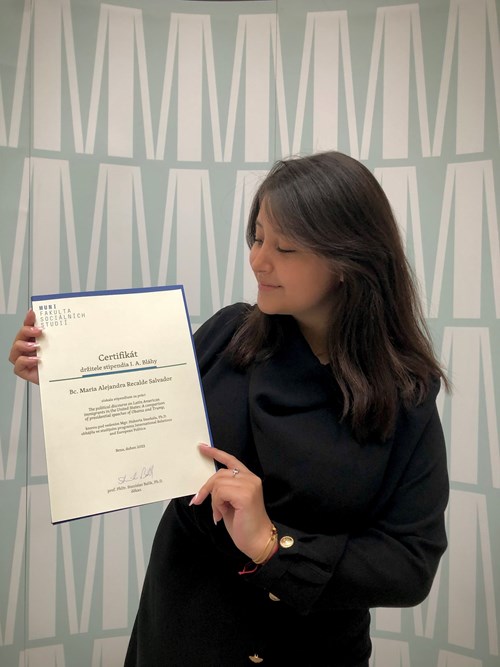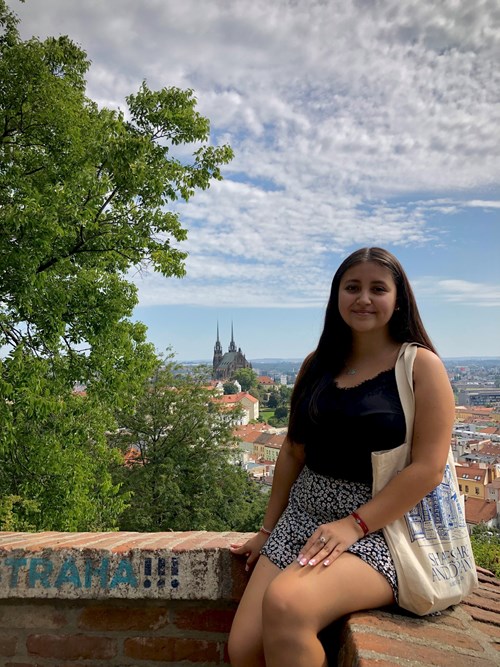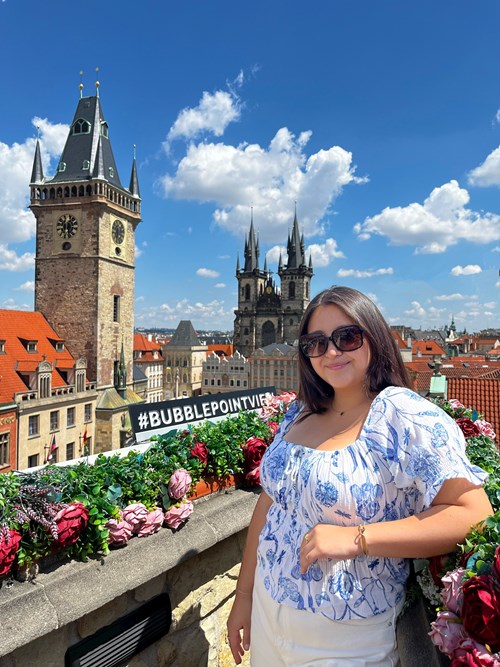
Maria Alejandra Recalde Salvador
Bachelor’s in International Relations and European Politics, graduated in 2022
Coming from Ecuador, currently studying MA in Latin American Studies at Leiden University in The Netherlands
interviewed by Michaela Nespěchalová, March 2024
1. Can you share some highlights of your time at the Faculty of Social Studies?
Some of the best memories I have from my time in FSS were that I was able to meet people from all over the world; I remember in one of my classes, we were students from over 30 different countries! I really enjoyed all the guest lecturers we had in different courses and all the activities the faculty would make as BBQs, job fairs, and even Christmas cookie decorations. Also, I loved the library, it was such a nice place to study and meet up with friends for study dates. Since the faculty is right in the city center of Brno, after a long study day, you could go with friends to have a coffee or dinner around the city.
2. How has your bachelor´ in International Relations and European Politics helped shape your academic or career path?
I think that my bachelor's in International Relations and European Politics at MUNI has helped me shape my academic path because the program allows you to pursue your own interests as there is a variety of elective courses that focus on specific regions and global issues. You have a lot of freedom to tailor your bachelor’s experience to your preferences and interests. During the summer I did a 3-month internship with CZECUspol in partnership with the Honorary Consulate of Ecuador in Prague. After that, I was also able to go on a year Erasmus+ exchange to the University of Bremen in Germany for my third year. Finally, I could select the thesis topic that I was really interested in, Latin American immigration to the United States. I am still on this path of public policy focused on Latin America following my MA in Latin American Studies at Leiden University in The Netherlands.
3. Can you share some examples of the specific skills and knowledge you gained during your program that have been valuable in your professional life?
I think that the international study environment helped me to bridge the gaps between different cultures with group work and other study activities, which I think is a very important skill when you want to work in the International Relations field. I recently came back from a 2-month research field trip in Mexico, and I can certainly say that many of the people and academic skills I had to use while being there and working were laid by the FSS teachers.
4. What were some of the most memorable courses or experiences during your bachelor‘s?
I have always been interested in Human Rights, Diplomacy and Democracy. Therefore, the most memorable courses I had were Human Rights, Democratization and Global Justice, International Organizations and Diplomacy, and Peace Economics. They are also memorable because of the great teachers. Part of what makes FSS so special is that each teacher is devoted to helping you understand and explore your interests. During my time in FSS, two professors who made it memorable were Professor Martin Chovančík, who was my teacher in some courses during the 3 years, and Professor Hubert Smekal, who was also my thesis supervisor.
5. Did you have any practical fieldwork or internship opportunities during your program?
Yes, as I mentioned briefly, the freedom to shape the bachelor allowed me to pursue an internship. Firstly, I had a meeting with Professor Martin Chovančík, who was the student advisor; he encouraged me and helped me with the formalities of the internship.
I had the opportunity to work hand in hand with the Honorary Consul of Ecuador in Prague and their Czech-Ecuadorian Cooperation (CZECUspol), I was in charge of promoting the Czech-Ecuadorian relations by starting a possible partnership between universities in both countries, as well as attending meetings and writing short articles about holidays to be posted on their websites/ social media.
6. Have you pursued further education or specialized training after completing your bachelor‘s?
Yes, in September 2023, I started a one-year MA program in Latin American Studies at Leiden University, where I specialize in Public Policy. Here, I am extending my initial research on Latin American immigration; however, this time, I focus on unaccompanied children and adolescents. In this master's, I am still enjoying the valuable classes I had at FSS.
7. What advice would you give current students looking to make the most of their education and prepare for future careers?
My advice is not to be afraid to shape your program to your personal interests and to approach teachers for help, as in my experience they have always been very open to doing so. To explore all the opportunities that you have under the university umbrella, go abroad, network with guest lecturers, visit faculty events such as discussion tables. My time at FSS flew by, so I can only tell you to enjoy time with the faculty and with your classmates.


